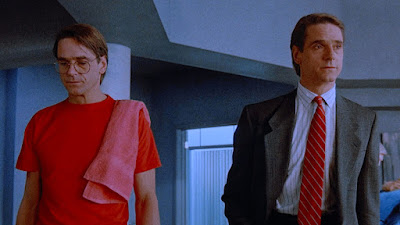A remake of the 1928 Paul Leni silent film The Last Warning (reviewed on this site several years ago), The House of Fear is yet another thriller set in the backstage world of the theater, a popular setting for mysteries and horror films in the '20s and '30s. It's a pleasantly entertaining movie that is not particularly special or memorable except in fleeting moments, and I don't have much to say about it, so this may be a shorter post than usual.
Retaining most of the 1928 film's narrative, The House of Fear is about an actor who drops dead mid-performance at a Broadway theater. His body disappears by the time the police arrive and is never found. The theater, owned by a pair of polar-opposite brothers (one a brusque, hulking middle-aged man with a tough-guy East Coast accent and the other a wimpy young guy with an inexplicable British accent), closes its doors after the scandal until an enterprising regional theatrical producer scrounges up enough financing to stage the same cursed play in the same location, with as much of the surviving cast as he can rehire. (The silent film had the reopening take place five years after the mysterious death, but this version shortens it to one year.)
The "producer" is actually an undercover detective trying to solve the murder, and he commits fully to the theatrical life, charging expensive cigars to his department so he can look the part of a Broadway producer. Oh, this makes his chief so mad. The guy's about to blow his top at these expenses! It's funny that the exasperated police chief has been a stock character in film for at least a century. These guys are always so mad at their detectives' antics while having to acknowledge that their unorthodox methods get results, damn it. It doesn't matter what decade it is or what's going on politically. Something about this cliché is deeply comforting to filmgoers' psyches. It's not just American movies, either. I've seen these characters pop up again and again in so much of world cinema.
Once most of the actors and crew are rehired and rehearsals start rolling, weird threats in the dead man's handwriting and even his own voice begin to appear. Could it be a gh-gh-gh-ghost? Soon, secrets about love triangles and feuds are revealed and hidden passageways are found. Another murder takes place under everyone's noses, and nefarious schemes are revealed, leading to much action and frantic exposition. The police chief gets even more exasperated. A character swings on curtains and ropes with considerable pizzazz while being chased. It all wraps up in an economical 67 minutes.
The House of Fear is difficult to write about. It's enjoyable and breezy, a couple clicks above mediocre, but it's not particularly special. (It did go over budget and over schedule, though, so there may be some behind-the-scenes juicy gossip.) This kind of thing has been done much better and much worse, and Joe May is neither a cinematic genius nor a soulless hack. It's a movie! You may like it if you like movies!
Joe May was an Austrian (real name Joseph Mandl) who got his start in the film business in Germany. May had a great reputation as a pioneer of German film, and he gave Fritz Lang his big break when he hired Lang as a screenwriter. Fleeing Germany for the United States in 1933, May ended up making b-movies for Universal.
More of a director-for-hire in the States, May saw many of his European peers eclipse him in Hollywood, and his life was full of hardships, particularly the death of his actress daughter Eva in 1924, whose biographical details seem ripped from a paperback melodrama (she was divorced three times from three different movie directors by age 22 and had one boyfriend leave her for Marlene Dietrich and another refuse her marriage proposal; she survived one suicide attempt and died from the other), his 1933 exile from Germany due to the Nazi regime, the business failure of the unsuccessful restaurant he and his wife opened in Los Angeles after he retired from filmmaking in the mid-1940s, bankruptcy, and a lengthy illness.






























